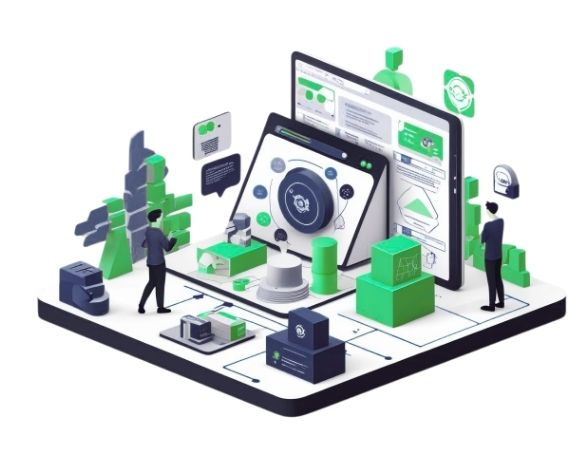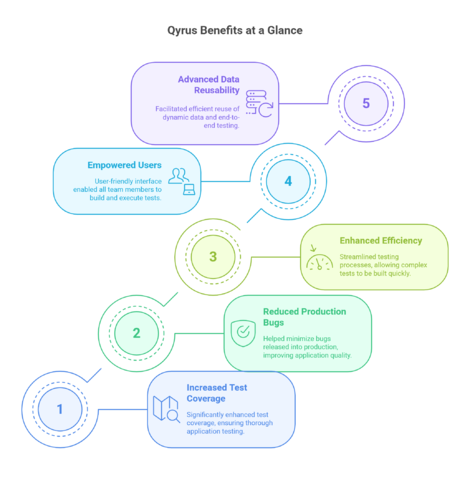AI-Powered Testing Transforms One of the Largest Beverage Companies


This case study explores how a leading global beverage business, one of the largest players in the consumer-packaged goods (CPG) industry, revolutionized its testing processes by transitioning from entirely manual methods to an advanced, AI-powered automated testing approach with Qyrus.
Facing persistent challenges such as lengthy testing cycles, inconsistent quality, declining test coverage, and difficulties in reusing dynamic data, the company sought an innovative solution. This article will detail how the implementation of Qyrus led to a significant increase in test coverage, a substantial reduction in production bugs, and a remarkable enhancement in overall testing efficiency and quality within their operations.
About the Client
This consumer-packaged goods company is a leading global beverage business, formed through the merger of several bottling companies and distribution companies. It operates in multiple markets across the globe. The company is known for marketing, producing, and distributing a wide range of beverages, including energy drinks, still and sparkling waters, juices, sports drinks, and ready-to-drink teas. It is recognized as the world’s largest independent bottler for a major beverage brand, boasting significant annual revenues and a large consumer base. The company focuses on sustainable growth, innovation, and meeting the specific needs of local markets while leveraging its scale and capabilities to drive growth.
The Challenge
When starting with Qyrus, the client was only performing manual testing. This was an issue since it was taking a large amount of time to complete the testing process and as a result quality was suffering overall. Taking too much time manually testing various processes and features on their app had caused test coverage to slip, as well, introducing virtual cracks to the foundation of their software.
The client had difficulty with automating their testing using traditional or conventional automation methods. Some of the testers were more experienced than others, and this was causing a gap in the quality of the manual tests being done. They also wanted to make sure that they were making use of reusing dynamic data throughout the test scripts.
Life with Qyrus
The client working in consumer-packaged goods is making use of multiple services on the Qyrus platform. Currently, Web Testing and Mobile Testing services are being used to build out web and mobile test scripts. Then, the client is able to perform end-to-end business process testing, chaining the web and mobile test scripts together and enabling test data to be transferred downstream between the individual web and mobile components.
Overall, the client feels that Qyrus is pretty easy to use and grasp. Implementing Qyrus’ testing strategy is not difficult at all and getting set up is as easy as recording your test or asking our AI to help you with test generation. A mixture of both technical and non-technical end users for the client are building and executing test scripts on Qyrus.
Key Features Used
- Global Variables: The client was able to make use of global variables to help with reusing data across their various web and mobile projects. This aided in their quest to reuse dynamic data across their scripts.
- End-to-End Business Process Testing: The client stitched together the web and mobile scripts into comprehensive business process tests that executed end-to-end flows for a complete picture into the behavior and performance of your various processes across your applications.
- Parameterization: The client was able to parameterize specific test steps in their scripts to aid with reusing data and executing different scenarios on a single test script. They were able to execute both happy and unhappy path test scenarios using this method.
- Script Tagging: By tagging their scripts, the client was able to better organize their test repository and scripts. This allowed for faster navigation around the app and quicker building of end-to-end flows.
- TestRail Integration: The client integrated Qyrus with their TestRail environment for the tracking of various test data and information.

Future Dreams
The client envisions a future where their automated testing processes continue to evolve and improve. They plan to explore advanced AI-driven testing techniques to further enhance the accuracy and efficiency of their test scripts. By integrating machine learning algorithms, they aim to predict potential issues before they arise, thus ensuring even higher quality and reliability in their applications.
In addition, the client is committed to expanding their use of Qyrus across all their global operations. They intend to leverage the platform’s capabilities to support continuous integration and continuous delivery (CI/CD) pipelines, enabling faster and more frequent releases of new features and updates. This will not only reduce time-to-market but also ensure that their products consistently meet the highest standards of quality.
Results & Outcomes
A PoC was originally done in August of 2024 where the client took Qyrus on a test drive for 6 weeks total. In the end, the client was able to achieve a significant increase in test coverage when implementing Qyrus’ automated test scripts when compared to their manual testing being performed. Data around how long it took team members to perform manual tests varies due to a differing level of knowledge and expertise on their team. And for the same reason the comfort level on Qyrus differed.
However, after a little more than 1 month, users reported being very comfortable with the platform. In total, it took the team 45 minutes to build a complex test of over 40+ steps.
The client had acquired 4 web licenses and 5 mobile licenses to spread across their team. As a result of using Qyrus, there has been a noticeable reduction in bugs spread into production by the client team.

Conclusion
Through the adoption of automated testing with Qyrus, the client working in consumer-packaged goods was able to significantly enhance their testing efficiency and quality. The ease of use and the comprehensive features of the Qyrus platform enabled both technical and non-technical team members to build and execute complex test scripts effectively. As a result, the client saw a marked increase in test coverage and a substantial reduction in production bugs. The successful implementation of Qyrus not only streamlined their testing processes but also allowed them to focus on delivering high-quality products to their consumers in the consumer-packaged goods industry. This transformation underscores the importance of embracing innovative solutions to overcome traditional testing challenges and drive sustainable growth.






